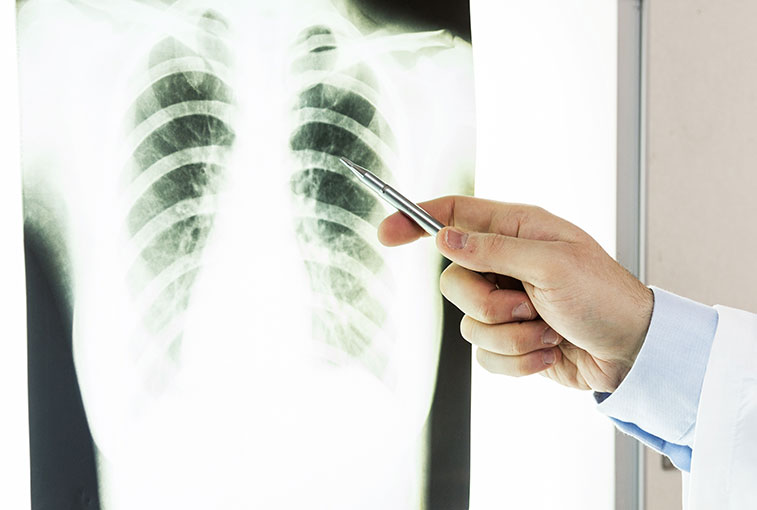What do the stages of lung cancer mean?
The staging system indicates how far the lung cancer has spread and whether surgery would help:
- Stage I has a surprisingly good prognosis—up to 70 percent of people who have it diagnosed at this stage can be successfully treated. Many lung cancers at this stage are only found by accident, usually from a scan for something else, or from a proactive lung screening because there are no symptoms.
- Stage II has a 50/50 cure rate. If the cancer has spread to a lymph node, you may not be able to tolerate surgery and instead have to be treated with a combination of chemotherapy and radiation.
- Stage III is the most common stage of lung cancer, if the patient hasn’t been diagnosed until they have symptoms. The cure rates may be 15 to 20 percent. Surgery is almost never recommended at this stage—chemo and radiation are usually the best treatment options.
- Stage IV is the most advanced stage, where the cancer has spread beyond the chest. At that point, we assume it’s incurable. That usually meant people would die within a year of being diagnosed. But with a lot of newer, directed cancer treatments, the prognosis can be much better. There’s still no cure when it’s at this stage, but we’re seeing some people respond to intravenous immune treatments, enzyme pills and other targeted treatments that don’t necessarily improve the cure rate at this stage but may give the patient some more time.
Is there anything to catch lung cancer early?
The early stages of lung cancer don’t typically have any symptoms, which makes it tough to diagnose before it becomes very difficult to cure.
There is a lot of hope in new lung cancer screening programs, which are proving to have the same risk reduction as women having annual mammograms. This screening is a CT scan of the chest for people who are high-risk for lung cancer—typically, people who have smoked heavily for many years.
What is the best way to prevent getting lung cancer?
Don’t smoke, and quit if you already do. Your risk for lung cancer is correlated to your level of smoking. If you smoke two packs a day, you have a higher risk correlation of getting lung cancer. If you smoke for many years, you have a higher risk of getting it.
Some people think they can’t just quit smoking—but anybody can quit if they’re scared enough. The patients I’ve had who do successfully quit, all the harassing they get didn’t matter a bit; they each had to have something that really scared them to quit. It can be done.
Try support groups, nicotine replacements or inhibitors, any aid you can get. Anybody can quit.
Are there any other risk factors of getting lung cancer?
Since there’s a delayed effect of whatever is carcinogenic—sometimes a 30- to 40-year lag—it’s taking forever to see a drop in the number of cases of lung cancer, and to nail down exactly what causes it, and who may be predisposed.
Some things that the medical community is still researching, with not fully conclusive answers yet, are:
- Why do women get lung cancer more than men?
- What is the effect of secondhand smoke doing to people’s lungs that may cause them to get the cancer?
- What is it in cigarettes that causes lung cancer? Nicotine makes you addicted, but it isn’t likely the carcinogen. Are there carcinogens in the things people smoke other than cigarettes, such as cigars, marijuana, e-cigarettes or illegal drugs?
- Are there causal links between lung cancer and radiation, radon, asbestos, or air pollution—or are they irritants that cause inflammation, which can make tissue more susceptible to becoming malignant?
- Is there a lung cancer gene? Genes with abnormal DNA repair can cause all sorts of cancers. Are there genetic risks or predispositions some people have with lung cancer?
Now what?
Lung cancer at any stage is not something to take lightly, so find a provider that’s constantly innovating. The Sanford Cancer Center wants to cure lung cancer by chipping away at it from all angles—proactive screenings, treatments, trials, getting people to quit, trying new drug therapies, anything we can to reduce the terrible burden of death that it still causes.
…
Posted In Cancer, Health Information, Imaging
